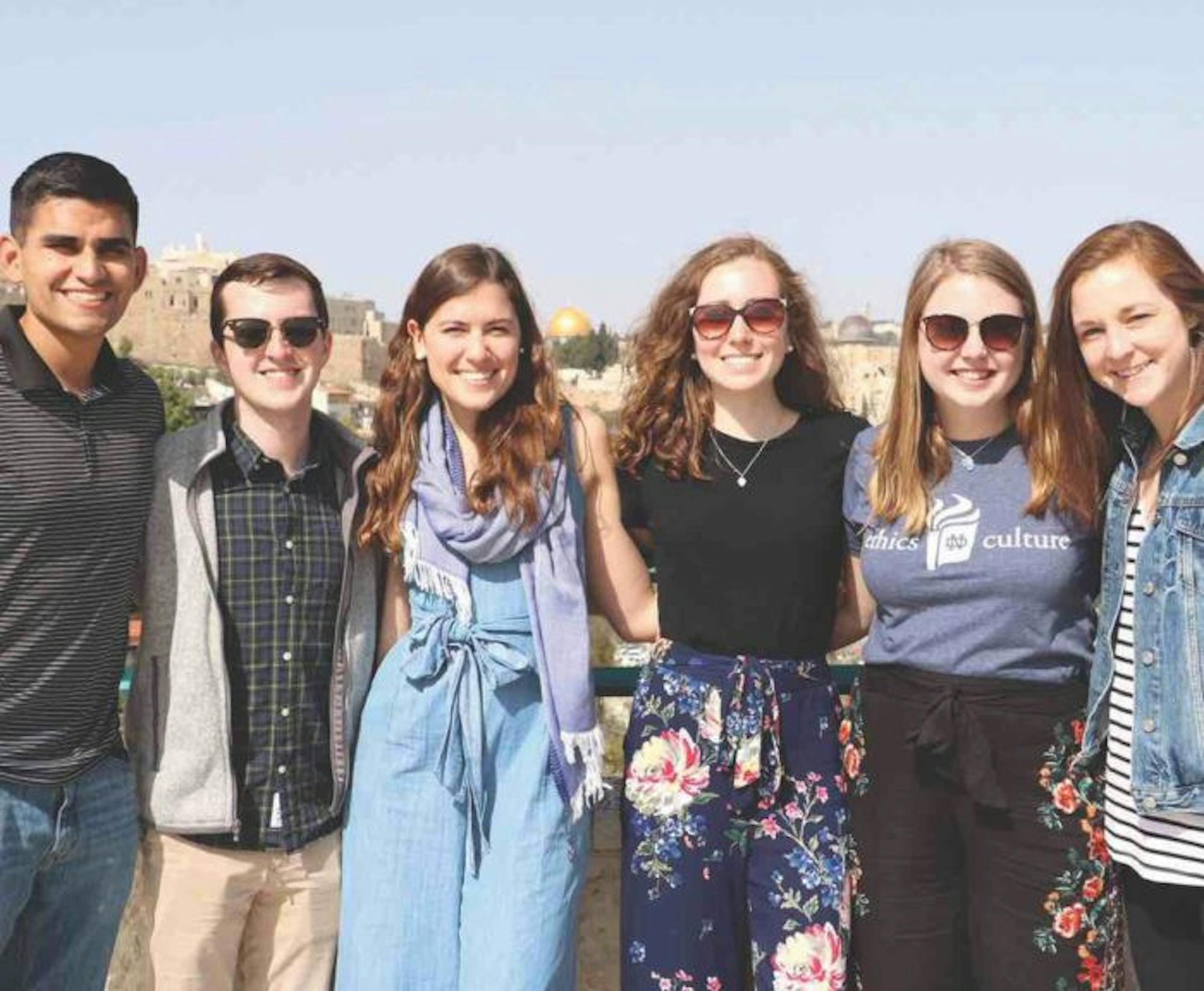Since its founding by the de Nicola Center for Ethics and Culture (dCEC) in 2014, the Sorin Fellows Program has expanded programming and grown in size. The program, established in conjunction with the bicentennial anniversary of Fr. Sorin’s birth, was created as a student formation program within the dCEC and shares the center’s dedication to exploring and sharing the richness of the Catholic moral and intellectual tradition.
“The program was started by the center to create a space for students to have an outlet for the integration and cultivation of their social, intellectual, spiritual and professional development as inspired by the Catholic moral and intellectual tradition,” student program director Pete Hlabse said in an email.
However, Hlabse emphasized that the program is not exclusively for Catholics — anyone, of any faith, is welcome to apply.

“We’re inspired by the Catholic identity of our University and center,” Hlabse said. “An important expression of that is not only engagement but friendship with anyone who thinks that the ideas of human dignity, authentic human freedom and the common good are important and relevant to grapple with.”
Hlabse came into his role as director in October of 2017 when the dCEC created a new position to specifically oversee the program.
“The program has grown substantially since I began working with the Center — primarily because there is now a staff member exclusively dedicated to student formation programming,” Hlabse said.
Junior Michael Kurkowski, who became a Sorin Fellow during his freshman year, has witnessed this expansion of the program.
“During my freshman year — even though that was only two years ago — I liked the things that they offered, but I don’t think it was as expansive as it is now,” Kurkowski said. “I really liked what they had to offer, and I really like how they’ve expanded and what they’ve offered since then.”
One popular Sorin Fellows program is the Sorin Supper Club — a series of dinners in which a Notre Dame faculty member has a small group of students over to his or her house for dinner. There is no formal plan for the events — students and faculty simply share a meal and conversation.
“It’s really nice to step off campus,” Kurkowski said. “I come from a big family, so it was nice to go to a professor’s house who also has a big family. I sort of felt like I was going back home for a little bit. It was nice to just sit back and relax and talk to them in that informal setting.”
The Sorin Fellows Program offers a variety of events and opportunities to its members, including opportunities for grants and funding.
“Some of our events are socially oriented, some of them are more intellectually oriented, some of them are more spiritually oriented and some of them are more directed towards professional development,” Hlabse said.
A more recently established event that the program offers is, “The Book That Changed My Life” lecture series. The series was founded in response to student feedback.
“Over time, it became clear that students were interested in engaging with faculty members beyond their interface with them in the classroom,” Hlabse said.
The series features Notre Dame faculty members who speak about how a book they read has challenged and changed them.
“Right now, it’s exclusive to Sorin Fellows, but next year I want to open it up to the entire campus community because I think this is a kind of interface that students want,” Hlabse said.
Freshman Sorin fellow Maggie Garnett said one of her favorite events is a weekly female discussion group called Vocation to Love. The group does a reading and then meets to discuss it at the house of Suzy Younger, a fertility care practitioner in South Bend who is affiliated with the dCEC.
“It’s a chance to sort of get out of the campus environment, and stepping out of the stress of classes and assignments and expectations of campus has been really important to me,” Garnett said.
Besides opportunities for participating in events, the Sorin Fellows Program also offers its members a community in which strong relationships are fostered, Garnett said.
“It does sort of give that extra community outside of dorm life or classes or clubs,” Garnett said. “It’s like that additional circle that sort of grounds you in a place at this University. It’s been very much like a home for me, which I’ve been very grateful for.”
Applications to the program are accepted on rolling basis, and the program is open to both undergraduate and graduate students. Currently, there are 225 undergraduate fellows and 60 graduate fellows, Hlabse said.
“The program really is what you make of it,” Garnett said. “If you want it to be your primary community and your primary extra-curricular, it can be. If it’s something that you come to from time to time, that’s also totally fine. There’s no minimum requirements, there’s no minimum GPA, there’s rolling applications, so there’s no point where you can’t apply — even if you’re a senior.”
Hlabse said he hopes the Sorin Fellows Program helps shape students into thoughtful people who will further Fr. Sorin’s vision for Notre Dame to be a force for good in the world.
“If graduating Sorin Fellows are committed to the idea that we don’t flourish as individuals, but as communities committed to the good, true and beautiful, then in a small way, the Sorin Fellows Program will have served a purpose,” he said.









